必修5过去分词作定语的用法
- 格式:ppt
- 大小:320.00 KB
- 文档页数:7
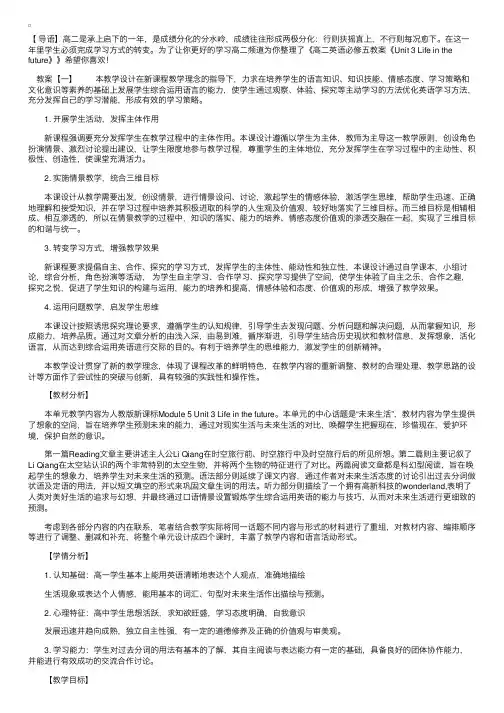
【导语】⾼⼆是承上启下的⼀年,是成绩分化的分⽔岭,成绩往往形成两极分化:⾏则扶摇直上,不⾏则每况愈下。
在这⼀年⾥学⽣必须完成学习⽅式的转变。
为了让你更好的学习⾼⼆频道为你整理了《⾼⼆英语必修五教案《Unit 3 Life in the future》》希望你喜欢! 教案【⼀】 本教学设计在新课程教学理念的指导下,⼒求在培养学⽣的语⾔知识、知识技能、情感态度、学习策略和⽂化意识等素养的基础上发展学⽣综合运⽤语⾔的能⼒,使学⽣通过观察、体验、探究等主动学习的⽅法优化英语学习⽅法,充分发挥⾃⼰的学习潜能,形成有效的学习策略。
1. 开展学⽣活动,发挥主体作⽤ 新课程强调要充分发挥学⽣在教学过程中的主体作⽤。
本课设计遵循以学⽣为主体,教师为主导这⼀教学原则,创设⾓⾊扮演情景、激烈讨论提出建议,让学⽣限度地参与教学过程,尊重学⽣的主体地位,充分发挥学⽣在学习过程中的主动性、积极性、创造性,使课堂充满活⼒。
2. 实施情景教学,统合三维⽬标 本课设计从教学需要出发,创设情景,进⾏情景设问、讨论,激起学⽣的情感体验,激活学⽣思维,帮助学⽣迅速、正确地理解和接受知识,并在学习过程中培养其积极进取的科学的⼈⽣观及价值观,较好地落实了三维⽬标。
⽽三维⽬标是相辅相成、相互渗透的,所以在情景教学的过程中,知识的落实、能⼒的培养、情感态度价值观的渗透交融在⼀起,实现了三维⽬标的和谐与统⼀。
3. 转变学习⽅式,增强教学效果 新课程要求提倡⾃主、合作、探究的学习⽅式,发挥学⽣的主体性、能动性和独⽴性,本课设计通过⾃学课本,⼩组讨论,综合分析,⾓⾊扮演等活动,为学⽣⾃主学习、合作学习、探究学习提供了空间,使学⽣体验了⾃主之乐,合作之趣,探究之悦,促进了学⽣知识的构建与运⽤,能⼒的培养和提⾼,情感体验和态度、价值观的形成,增强了教学效果。
4. 运⽤问题教学,启发学⽣思维 本课设计按照诱思探究理论要求,遵循学⽣的认知规律,引导学⽣去发现问题、分析问题和解决问题,从⽽掌握知识,形成能⼒,培养品质。
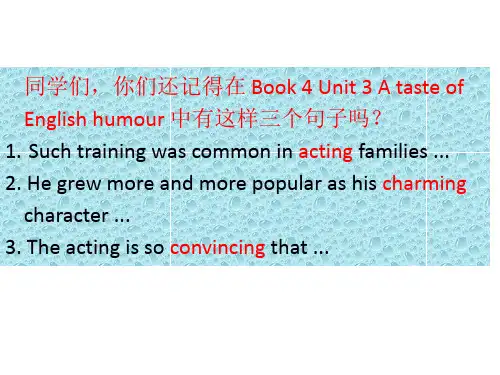
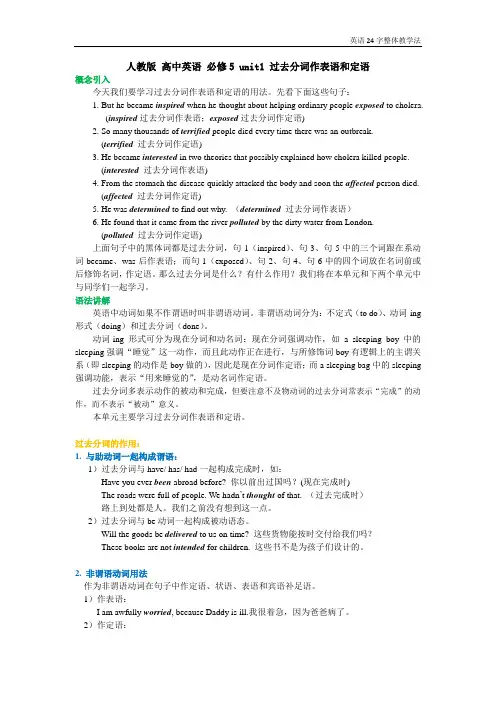
人教版高中英语必修5 unit1 过去分词作表语和定语概念引入今天我们要学习过去分词作表语和定语的用法。
先看下面这些句子:1. But he became inspired when he thought about helping ordinary people exposed to cholera.(inspired过去分词作表语;exposed过去分词作定语)2. So many thousands of terrified people died every time there was an outbreak.(terrified过去分词作定语)3. He became interested in two theories that possibly explained how cholera killed people.(interested 过去分词作表语)4. From the stomach the disease quickly attacked the body and soon the affected person died.(affected过去分词作定语)5. He was determined to find out why. (determined过去分词作表语)6. He found that it came from the river polluted by the dirty water from London.(polluted过去分词作定语)上面句子中的黑体词都是过去分词,句1(inspired)、句3、句5中的三个词跟在系动词became、was后作表语;而句1(exposed)、句2、句4、句6中的四个词放在名词前或后修饰名词,作定语。
那么过去分词是什么?有什么作用?我们将在本单元和下两个单元中与同学们一起学习。
语法讲解英语中动词如果不作谓语时叫非谓语动词。
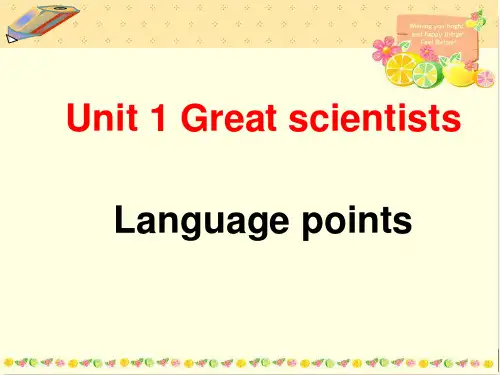
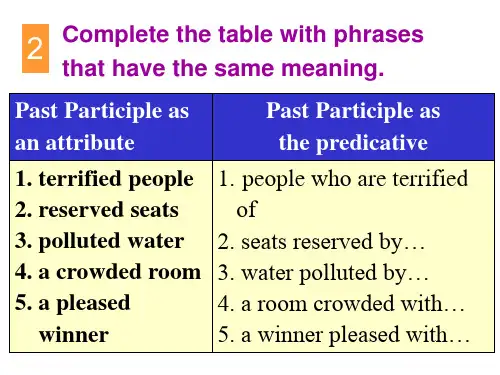
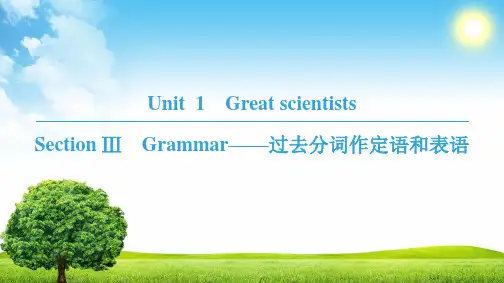

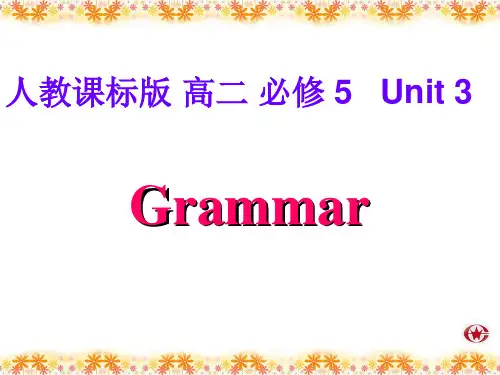
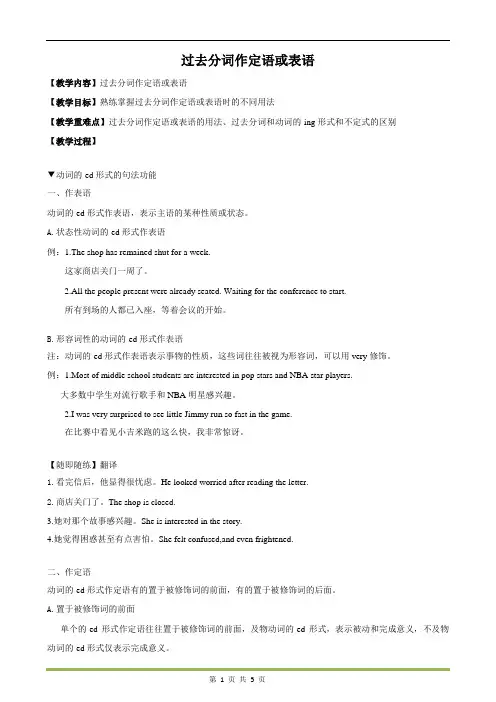
过去分词作定语或表语【教学内容】过去分词作定语或表语【教学目标】熟练掌握过去分词作定语或表语时的不同用法【教学重难点】过去分词作定语或表语的用法、过去分词和动词的-ing形式和不定式的区别【教学过程】▼动词的-ed形式的句法功能一、作表语动词的-ed形式作表语,表示主语的某种性质或状态。
A.状态性动词的-ed形式作表语例:1.The shop has remained shut for a week.这家商店关门一周了。
2.All the people present were already seated. Waiting for the conference to start.所有到场的人都已入座,等着会议的开始。
B.形容词性的动词的-ed形式作表语注:动词的-ed形式作表语表示事物的性质,这些词往往被视为形容词,可以用very修饰。
例:1.Most of middle school students are interested in pop stars and NBA star players.大多数中学生对流行歌手和NBA明星感兴趣。
2.I was very surprised to see little Jimmy run so fast in the game.在比赛中看见小吉米跑的这么快,我非常惊讶。
【随即随练】翻译1.看完信后,他显得很忧虑。
He looked worried after reading the letter.2.商店关门了。
The shop is closed.3.她对那个故事感兴趣。
She is interested in the story.4.她觉得困惑甚至有点害怕。
She felt confused,and even frightened.二、作定语动词的-ed形式作定语有的置于被修饰词的前面,有的置于被修饰词的后面。
A.置于被修饰词的前面单个的-ed形式作定语往往置于被修饰词的前面,及物动词的-ed形式,表示被动和完成意义,不及物动词的-ed形式仅表示完成意义。
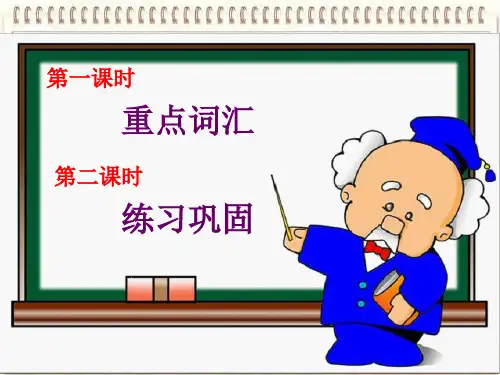

高二英语必修五第一单元集体备课整体教案(定稿)主备人:胡容容一,教材分析和教材重组1. 教材分析本单元主要话题是How to organize scientific research。
旨在通过本单元的教学培养学生探究科学、崇尚科学的精神和正确的科学观;帮助学生了解科学的本质和科学家的特质,使学生懂得科学探究的基本步骤和要素;指导学生如何对科学家及其所从事的科研工作进行描述、发表看法,并针对自己的个性特征和兴趣专长,畅谈个人的职业志向和人生规划。
1.1 Warming Up 通过问答形式使学生回顾不同领域不同时代的10位科学家,了解他们对人类的贡献及其成果。
1.2 Pre-reading 通过对几个问题的讨论,使学生了解传染病和“霍乱”的基本常识,并了解科研过程中验证某些观点的基本程序和方法。
1.3 Reading 介绍英国著名医生John Snow是如何通过考察分析、探究的科学方法,发现并控制“霍乱”这种传染病的。
通过课文学习,使学生了解科学发现的全过程及其严密性;学习描述性文体的基本写作框架。
1.4 Comprehending 共设计了四个题型。
1.5 Learning about Language 共设计了两大部分,8个练习,对本单元的重点词汇和主要语法项目进行训练。
第一部分的1-4题旨在训练学生对重点词汇、短语的运用;第二部分旨在练习过去分词作定语和表语的用法。
1.6 Using Language 由两部分组成:Listening and speaking 是一段关于中国著名科学家钱学森先生的生平介绍的听力材料;Reading and writing是一段关于伟大天文学家哥白尼发表“日心说”过程的短文。
2.教材重组2.1 将Warming Up,Pre-reading, Reading和Comprehending三部分整合为一节“精读课”。
2.2 重点讲解Reading中的语言点,句子结构为一节课。
2020高考一轮复习教材串讲必修5 Unit 3 Life in the future讲义1._____________________________n.方面;层面2. ____________________________n.[C]印象;感觉3. ____________________________adj.时常发生的;连续不断的____________________________adv.不断地4. ____________________________adj.在前的;早先的5. ____________________________n.&vt. n.[C]向导;导游;指南;手册vt.为……领路;带领;引导6. ____________________________n.[U]缺乏;没有vt.&vi.缺乏;短少;没有7. ____________________________n. [C]& [U]调整;调节8. ____________________________n. [C]①开关;电闸②转换;改变;变化vt.①转变;交换②开关(电器等设备)9. ____________________________adj.乐观的____________________________ adj.悲观的10. ____________________________n. & adj.瞬间;片刻;立即的;立刻的1. ________________________________拿起;开始;继续2. ________________________________(困境后)恢复;完全复原3. ________________________________看不见……4. ________________________________打扫;横扫5. ________________________________(快捷而悄声地)移动;溜进6. ________________________________加速1. ______________________________________________________________.由于缺乏新鲜空气,我感动头疼。
名师语法课堂:过去分词作定语和表语用法详解概念引入今天我们要学习过去分词作表语和定语的用法。
先看下面这些句子:1. But he became inspired when he thought about helping ordinary people exposed tocholera. (inspired过去分词作表语;exposed过去分词作定语)2. So many thousands of terrified people died every time there was an outbreak.(terrified过去分词作定语)3. He became interested in two theories that possibly explained how cholera killedpeople.(interested 过去分词作表语)4. From the stomach the disease quickly attacked the body and soon the affectedperson died.(affected过去分词作定语)5. He was determined to find out why. (determined过去分词作表语)6. He found that it came from the river polluted by the dirty water from London.(polluted过去分词作定语)上面句子中的斜体词都是过去分词,句1(inspired)、句3、句5中的三个词跟在系动词became、was后作表语;而句1(exposed)、句2、句4、句6中的四个词放在名词前或后修饰名词,作定语。
那么过去分词是什么?有什么作用?我们将在本单元和下两个单元中与同学们一起学习。
语法讲解英语中动词如果不作谓语时叫非谓语动词。
非谓语动词分为:不定式(to d o)、动词-ing形式(doing)和过去分词(done)。
人教新课标必修五unit1词汇及语法解析1. characteristic用作名词,意思是“特点;特征;特性”与feature意思相近。
它也可用作形容词意为“典型的;具有…的特点的”。
Traffic jams are a characteristic of large cities. 堵车是大城市的特点。
The smell is characteristic of garlic. 这气味是大蒜的特点。
He speaks with characteristic passion. 他以特有的热情说话。
2. put forward的意思是“提出主意、计划(offer, suggest , an idea)等”。
He often puts forward some useful advice. 他常常提出一些有用的建议。
〖帮你归纳〗put的常用词组有:put aside节省(钱、时间);储蓄;把……放在一边put away储存(钱);放好put back拨慢;搁置put down放下;记下;击败;使(飞机)着陆;put off延期;推迟put on上演;穿上;戴上put out熄灭;关掉;扑灭put through接通电话;完成put up with忍受;忍耐put into action/effect/practice实施;实行3. examine的意思是“检查;审查;诊察;考察;测验”。
The doctor examined her carefully.医生仔细地给她作了检查。
The teacher examined the students on the book they read. 老师就学生读的书考学生。
examine指的是仔细观察以了解或发现什么东西,也可用于医生检查病人,以书面或口头的形式考察学生的知识与能力。
check指的是通过检查以确保某事物正确、安全、满意或处于良好状态,核对,核实某物等。
过去分词的用法过去分词在句中可以1)构成谓语:a. 和have一道构成完成时态或非谓语动词的完成形式:I haven’t been out much recently.我最近没太出门。
I knew you had been busy. 我知道你一直很忙。
I’m sorry not to have given you enough help. 对不起没给你足够的帮助。
Having read the instructions, she snatched up the fire extinguisher. 看完说明书之后,她抓起了灭火器。
b. 和be一道构成被动语态或非谓语动词的被动形式:The letter has been opened! 信被人拆开了。
He was said to have been arrested. 据说他被捕了。
2)用作表语:I am awfully worried. Daddy is ill.我很着急,我爸爸病了。
3)用作定语:She had a worried look on her face. 他满面愁容。
4)构成复合宾语:She wanted the work finished by Friday. 他要求这工作星期五前完成。
5)作状语:Aroused by the crash, he leapt to his feet. 他被撞击声惊醒,一跃站起身来。
过去分词只有一种形式,在大多数时候下都有被动的意思。
2、过去分词作表语编辑本段回目录1) 过去分词作表语的时候很多(其中有很多已变成形容词):He was amazed and enchanted at the sight. 看到这情景他感到惊异着迷。
She was annoyed at your saying that. 你这样讲她很不高兴。
We were so bored that we couldn’t help yawning. 我们烦得要命禁不住打哈欠。
Book 5 Unit 1 Great Scientists Part 1 课文知识点归纳1. put forward 提出put off 推迟put up with 忍受2. attend to 照顾, 护理3. cure sb. of sth 治愈某人某种疾病a cure for…治疗…法(药)4. challenge sb. to do sth. 向某人挑战做…challenge sb. to sth. 就某事向某人挑战5. be absorbed in 全神贯注于= concentrate on6. suspect sb. of sth 怀疑某人做某事suspect that…7. blame sb. for sth. 为某事责怪某人blame sth. on sb. 把某事归咎于某人8. link sth to把…与…连接起来, 使…有联系9. instruct sb to do sth 命令某人做某事 instruct sb in sth 在某方面教导某人10. be strict with sb. 对某人严格要求 be strict in sth. 对某事严格要求11. lead to 造成, 导致, 通向12. make sense 讲得通, 有意义make sense of 了解…的意义, 理解13. put sth. in order 按…顺序来整理14. draw a conclusion 得出结论15. of one’s day 在某人的那个时期16. expose… to 使显露, 暴露17. apart from 除…之外18. be cautious about / of …对…小心谨慎with caution 小心谨慎19. be severe with sb. 对…严厉20. lift up 举起21. look into 调查22. be determined to do sth 决心/ 决定做某事23. make investigations 进行调查24. take in 吸收, 欺骗25. come to an end 结束26. punish sb for sth. 因某事惩罚某人27. at times 时而, 不时28. be for / against 支持/ 反对29. a link between…and…与…间的联系/关联30. point of view 观点31. hold discussions 进行讨论32. to one’s surprise 使某人感到惊奇的是33. believe in 信任, 信仰, 相信34. prevent sb from doing sth 阻止某人做某事35. in one’s honor / in honor of sb.为了纪念某人句型: 1. It seemed that the water was to blame. be to blame 受责罚 (主动形式表被动)2. A woman, who had moved away from Broad Street, liked the water from the pumpso much that she had it delivered to her house every day.have sth done 请某人来做某事 / 遭遇,经历,体验3. To prevent this from happening again, John Snow suggested that the source ofall water supplies be examined.suggest 意为”建议”时, 宾语从句谓语动词应使用虚拟.4. The second suggested that people absorbed this disease into their bodies with their meals.suggest 意为”认为, 指出, 提出, 暗示”时, 宾语从句谓语动词则使用陈述语气5. Only if you put the sun there did the movements of the other planets in the sky make sense.Only + 状语 / 状语从句位于句首, 主句需用倒装If only “如果…就好了”, 后接虚拟条件句.[选词填空](1) I wake up _______________ the alarm clock rings(2) _______________ John were here with us!(3) _______________ I get a job can I have enough money to continue my studies at college.6. He placed a fix sun at the center of the solar system with the planets goinground it and only the moon still going round the earth.with 的复合结构 (with + 宾语 + 宾补)Book 5 Unit 2 The United KingdomPart 1 课文知识点归纳1. consist of = be made up of 由…组成make up 组成, 编造, 化妆2. get all five questions right五个问题全答对了3. divide… into…把…分成separate…from 把…分离, 分开4. refer to 提到,涉及,参考,指的是5. without conflict 没有纷争6. in the early / middle / late twentieth century在二十世纪早期/ 中叶/ 后期7. break away (from) 脱离8. to one’s credit 为…带来荣誉, 值得赞扬9. for convenience 为了方便起见10. in the 1060s 在十一世纪六十年代11. find evidence of 找到…的证据12. keep your eyes open 睁大眼睛13. make your trip enjoyable and worthwhile使得你的旅程有趣又值得14. leave out 省去, 遗漏, 不考虑15. take the place of = take one’s place 取代…16. break down 机器损坏, 破坏17. be unwilling to do…不乐意做…18. sb. be familiar with sth. 某人对…熟悉sth. be familiar to sb. 某物对…是熟悉的19. a furnished house with all modern conveniences 一套有各种现代设施的配有家具的房子20. be alike in…在…方面类似21. pick up 拾起, 养成…习惯, 学到22. wear the four-hundred-year-old uniform穿着一件有四百年历史的制服23. in memory of…为了纪念…24. just as…正当…的时候25. have a photo taken (have sth. done) 拍照26. on show 被展出27. feel / be proud of 为…感到骄傲28. leave …for…离开…前往…29. fall asleep 睡着30. have problems in doing…做某事遇到麻烦31. at one time 曾经32. break down 打破, 分解33. be delighted with 对…感到高兴34. take place 发生,举行35. at this / that time 在此时/ 在那时36. at war (with) 处于交战状态37. be friendly to 对…友好38. change one’s mind 改变主意39. be disappointed at 对…感到失望40. come close to 接近41. took flight (take flight 703) 逃跑, 飞翔(乘坐703次航班)42. start the fire 点火, 放火43. make into 把…职称, 使…转变为句型: 1. How long does it take to fly from Beijing to London Heathrow Airport?it takes sb. sometime to do sth. 花了某人多少时间做某事2. These cities are not as large as those in China.A 是B的三倍长: 1) ______________________________________2) ______________________________________3) ______________________________________3. It’s a pity that the industrial cities built in the nineteenth century do not attract visitors.built in the nineteenth century 过去分词短语作后置定语修饰citiesIt’s a pity that…“遗憾的是…”常使用陈述语气; 若是跟虚拟语气, 常表示“竟然, 居然”等强烈的感情色彩.[句型翻译]他错过了这次机会, 真是可惜_________________________________________________真可惜, 他竟然错过了这样好的一个机会._________________________________________________4. Worried about the time available, Zhang Pingyu had made a list of the sitesshe wanted to see in London.Worried about the time available 过去分词短语作原因状语5. This solid, square tower had remained standing for one thousand years.remained standing 仍旧矗立着, remain 是一个系动词, 表示”一直保持着某种状态”remain还可以作不及物动词, 意为”剩下, 留下”6. There followed St. Paul’s Cathedral built after the terrible fire of London in 1666.There followed…接下来的是7. It seemed strange that the man who has developed communism should have livedand died in London.It’s strange / natural / important / necessary that + (should do) …Book 5 Unit 3 Life in the futurePart 1 课文知识点归纳1. make a deep / strong impression on sb.给某人留下深刻印象impress sb with sth = impress sth on sb 使某人记住某事2. take up 拿起,占用,接受,开始,从事,选修speed up 加速sweep up 打扫,横扫,掠过3. remind sb of sth使某人回想起某事/提醒某人某事remind sb to do sth 提醒某人去做某事remind sb that 提醒某人4. as a result 结果5. suffer from 遭受,患…病6. be similar to 和…相似7. feel sleepy 感到困倦8. fall fast asleep 睡得很香9. the / a lack of 缺乏…for lack of…由于…的缺乏be lacking in 缺乏(品质/特点)lack for…(否定句) 缺乏…10. in no time / in an instant 很快,立即11. be back on one’s feet (从病痛/挫折中)复原12. in all directions 四面八方13. ab. lose / catch sight of…看不见/看见sb / sth be in / out of sight 看得见/看不见at first sight 第一眼at the sight of 一看见…就…14. provide A with B 向A提供B15. lie relaxed 放松16. be previous to…早于17. have little oxygen left 剩下很少的氧气have twenty minutes left 剩下二十分钟18. for health reasons 处于健康原因19. bend the rules 变通,放宽20. on earth 究竟,到底21. be under repair在维修中22. make adjustments to 调节,适应23. fasten the safety belt 从…系紧安全带24. from under the floor 从…下25. stay long 停留,逗留26. in space 在太空27. the up-to-date invention 最新的发明28. environment friendly 环保29. dispose of 处理,解决30. be greedy for / to do sth. 渴望,贪婪31. programme robots 为机器人设计程序32. perform tasks 完成工作33. space settlements 太空定居点34. have the chance of 有…的机会35. be described as 被描述为…36. be equipped with 配备有…37. without permission 未经允许38. feed into 输入进…39. top-of-the-range 最高标准的, 顶级的40 slide into 溜进,滑进句型: 1. Below are some of the main aspects of life today.2. My new surroundings are difficult to tolerate.3. The air seemed thin as though its combination of gases had little oxygen leftas though引导方式状语从句[句型翻译] 她看起来似乎会把这件事告诉所有人___________________________________________________似乎你是对的___________________________________________________4. I lost sight of Wang Ping when we reached what looked like a large market…when 引导时间状语从句中又包含一个what引起的宾语从句.即:what looked like a large market 作reach的宾语5. Exhausted, I slid into bed and fell fast asleep.exhausted过去分词在句中作状语, 相当于As I was exhausted.6. This is similar to the “Jet lag”you get from flying, but it seems you keep gettingflashbacks from your previous time period.并列分句中包含有句型: It seems (that)…意为”似乎…, 看来…”Book 5 Unit 4 Making the newsPart 1 课文知识点归纳1. be delighted at / with sth. 对某事感到高兴be delighted to do sth. 很高兴做某事be delighted + that从句2. go out on a story 外出采访3. cover a story 进行新闻采访4. be eager to do sth. 渴望做某事be eager for sth 渴望某事5. assist (sb.) in / with sth帮助/救援/协助某人做某事assist (sb.) in doing sthassist (sb.) to do sth6. concentrate on 集中,全神贯注于7. have a good nose for 嗅觉灵敏, 善于8. inform sb of sth 告知某人某事9. keep sth in mind 记住10. depend on 依赖,取决于11. get sth. straight 搞清楚,弄明白12. accuse sb of sth 因某事而指责或控告某人13. so as to do sth. 为了做某事14. stop sb. (from) doing sth 阻止某人做某事15. look forward to (doing) sth 期待某事16. by accident意外地17. get / be adsorbed in 专心于…18. defend sb. against…保卫某人免受19. by the name of…名叫20. set to + n.着手,开始做某事set out to do sth. 开始, 着手做某事 set about doing sth.21. pass sth on to sb. 把某人递给某人22. last of all 最终23. make an appointment 约会make appointments24. be supposed to 应当,认为必须25. approve of sb. sth 赞成,称许,批准26. a trick of the trade 诀窍,窍门play a trick (tricks) on sb. 捉弄,戏弄某人27. take notes 记录,记下28. ahead of 在…前面,先于…句型: 1. Never will Zhou Yang forget his first assignment at the office of a popular English newspapernever为表示否定含义的副词放在句首引起倒装.2. Not only am I interested in photography, but I took am amateur course atuniversity to update my skills.not only…but also…引导的倒装句. not only放在句首,后接句子, 用倒装结构3. Only if you ask many different questions will you acquire all the informationyou need to know.Only + 状语(单词/短语/从句)放句首,引起倒装. (若only + 状从, 主句谓语动词倒装)[句型翻译]只有你才可以到处走动_________________________________________________只有每个人都尽力而为, 我们的城市才会变得更美._________________________________________________4. Here comes my list of dogs and don’ts.here, there, now, then等副词放在句首用倒装句(完全倒装)5. Have you ever had a case where someone accused your journalists of gettingthe wrong end of the stick?当先行词为case, stage, situation, point时, 多用where引导定语从句Book 5 Unit 5 First aidPart 1 课文知识点归纳1. fall in 生病2. get injured / burned / infected受伤 / 烧伤 / 受感染3. do / give / offer first aid to sb.对某人实施急救4. if possible 有可能的话5. be taken from 从...节选6. act as 充当,担任7. a barrier against... 抵御...的一道屏障8. prevent...from doing sth 阻止...做某事9. sense of touch 触觉10. a variety of 各种各样的11. depend on... 取决于12. within a day or two 在一两天内13. for a moment 片刻14. electric shock 触电15. turn white 变白16. squeeze out 榨出;挤出17. over and over again 多次18. in place 在适当的位置19. sit up 做起来;迟睡熬夜20. knock over 撞到;打翻21. cut off 切掉;使隔绝22. a number of 许多23. stick to 坚持;黏在...上24. apply to sb. for sth. 向某人申请...apply to sth 适用于apply oneself to 专心从事...25. make a difference 产生区别,有影响26. protect...against... 保护...免受...27. in case 如果;万一;以免28. after use 使用后29. out of the reach of sb. / out of one's reach某人够不着的地方30. leave sb. alone 让某人独自呆着;不打扰31. cause a damage to 对...造成损害32. set...fire on 放火烧33. in good condition 状况良好句型: 1. Remove clothing using scissors if necessary unless it is stuck to the born.◇unless引导条件状语从句,意思是“除非...;如果不”,相当于if not2. John was studying in his room when he heard screaming.when在句中是并列连词,意思是“正在这时/那时”,◇常见句型:be doing...when...,正在做...这时...;had done...when...刚做完...这时...;be about to do...when...就要...这时...;be on the point of doing...when...正要做...这时...[句型翻译]正当我在街上乱逛之时, 我看见了一位老朋友.________________________________________________我正准备去游泳, 突然我们的向导看见了我并大声叫我.________________________________________________3. There is no doubt that John's quick thingking and the first aid skills he learnedat school saved Ms. Slades's life.◇ There is no doubt...(= No doubt that…) 毫无疑问...[句型翻译]毫无疑问, 我们将很快实施这个计划.________________________________________________4. It was John's quick action and knowledge of first aid that saved Ms. Slade's life.◇本句为强调句型。